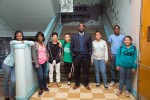About 40 students started high school as the inaugural ninth-grade class at the Horace Mann UCLA Community School last week.
Horace Mann, which originally taught only sixth to eight grade, added the ninth-grade class as part of a February agreement between the UCLA Graduate School of Education and Information Studies and the Los Angeles Unified School District to work together to revitalize Horace Mann Middle School in South Los Angeles, said Christine Shen, director of the UCLA Community Schools Initiative.
This partnership follows other UCLA-supported enrichment programs, including the UCLA Summer Institute and an ethnic studies program taught by a UCLA grad student.
Karen Quartz, director of research and development for the UCLA Community Schools Initiative, said LAUSD approached UCLA with the proposal to reform the school following the success of the Robert F. Kennedy Community School in Koreatown, which formed from another partnership between UCLA and LAUSD. Since the partnership began, the average percentage of Kennedy community school students attending college has been consistently higher than the national average, Quartz said.
Shen said LAUSD chose Horace Mann Middle School over other district schools because of its significant enrollment decline and high population of children who live in foster care or have special needs.
Shen said the school’s issues with teaching staff and dwindling resources gave it a negative reputation within the community. Some eighth-grade students have even left the school rather than continue for the ninth grade, she added.
Representatives from UCLA, LAUSD and staff and parents from the Mann community have been meeting since fall 2015 to plan how the school would look moving forward, Shen said. They designed the school to mimic charter schools and its curriculum to be more flexible than that of traditional district schools, she added.
However, Shen said that LAUSD’s changing leadership, including a new superintendent, made it difficult to gain executive support and slowed the project’s development.
Another problem the school faced was coordinating the different aspects of the project, such as development, recruitment and community engagement, Quartz said.
“You have to figure out a lot of moving pieces,” Quartz said. “(It’s like) we’re trying to build a plane while we’re flying it.”
Shen said the school has also had difficulty gaining the community’s trust.
Jody Priselac, associate dean of community programs in GSEIS, said while UCLA and Horace Mann staff originally disagreed on the school’s curriculum design, they eventually came to an agreement.
“Building trust is key to the success of the partnership,” Priselac said. “It is absolutely necessary to come to the table respecting what each of us bring.”
Previous plans to revitalize the school were left unfinished and made parents and staff initially skeptical of UCLA’s dedication to Horace Mann, Shen said. But she said she thinks university-sponsored programs and opportunities for graduate education students to work at Horace Mann will improve the relationship between parents, staff and UCLA.
“Even with the UCLA name, it’s hard to build trust in the community,” Shen said. “It’s starting to change but it’s going to take a while.”
Shen said despite the challenges, the school is already starting to see results.
Shen said Mann is starting the school year fully staffed, which has never happened before. Previously, the district sent underperforming teachers to the school as punishment, decreasing staff enthusiasm. She added most of the new staff will be graduates of the UCLA Teacher Education Program.
Shen also said partnering with UCLA has helped Horace Mann find ways to support students on their journey to college. The school’s directors are speaking with donors affiliated with UCLA about funding the education of Horace Mann students who attend college.
Quartz said she hopes Horace Mann will expand beyond middle and high school to kindergarten and elementary school because she thinks students and families will benefit from a long-term relationship with the school.
In addition, Horace Mann is working with UCLA education professor Wellford Wilms, the Los Angeles Police Department and One Way, a nonprofit, to designate Horace Mann as a safe haven site with health clinics and programs that support foster care parents and students, Shen said.
“I think the biggest challenge is making it real on the community level, not just the school level,” Quartz said. “(But) we all have high hopes. We wouldn’t be doing this unless we didn’t.”
